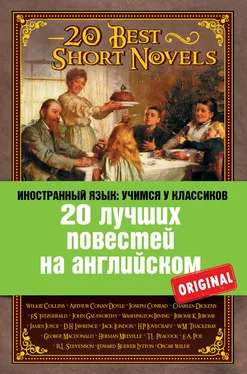‘Bear back this news, Jew, to the Alfaqui,’ howled the Don, spurning the beauteous corpse with his foot. ‘I would not have ransomed her for all the gold in Barbary!’ And shuddering, the old Jew left the apartment, which Ivanhoe quitted likewise.
When they were in the outer court, the knight said to the Jew, ‘Isaac of York, dost thou not know me?’ and threw back his hood, and looked at the old man.
The old Jew stared wildly, rushed forward as if to seize his hand, then started back, trembling convulsively, and clutching his withered hands over his face, said, with a burst of grief, ‘Sir Wilfrid of Ivanhoe! – no, no! – I do not know thee!’
‘Holy mother! what has chanced?’ said Ivanhoe, in his turn becoming ghastly pale; ‘where is thy daughter – where is Rebecca?’
‘Away from me!’ said the old Jew, tottering. ‘Away! Rebecca is – dead!’
When the Disinherited Knight heard that fatal announcement, he fell to the ground senseless, and was for some days as one perfectly distraught with grief. He took no nourishment and uttered no word. For weeks he did not relapse out of his moody silence, and when he came partially to himself again, it was to bid his people to horse, in a hollow voice, and to make a foray against the Moors. Day after day he issued out against these infidels, and did nought but slay and slay. He took no plunder as other knights did, but left that to his followers; he uttered no war-cry, as was the manner of chivalry, and he gave no quarter, insomuch that the ‘silent knight’ became the dread of all the Paynims of Granada [802]and Andalusia, and more fell by his lance than by that of any the most clamorous captains of the troops in arms against them. Thus the tide of battle turned, and the Arab historian, El Makary, recounts how, at the great battle of Al Akab, called by the Spaniards Las Navas, the Christians retrieved their defeat at Alarcos, and absolutely killed half a million of Mahometans. Fifty thousand of these, of course, Don Wilfrid took to his own lance; and it was remarked that the melancholy warrior seemed somewhat more easy in spirits after that famous feat of arms.
Chapter VII
The end of the performance
In a short time the terrible Sir Wilfrid of Ivanhoe had killed off so many of the Moors, that though those unbelieving miscreants poured continual reinforcements into Spain from Barbary, they could make no head against the Christian forces, and in fact came into battle quite discouraged at the notion of meeting the dreadful silent knight. It was commonly believed amongst them, that the famous Malek Ric, Richard of England, the conqueror of Saladin, had come to life again, and was battling in the Spanish hosts – that this, his second life, was, a charmed one, and his body inaccessible to blow of scimitar or thrust of spear—that after battle he ate the hearts and drank the blood of many young Moors for his supper: a thousand wild legends were told of Ivanhoe, indeed, so that the Morisco warriors came half vanquished into the field, and fell an easy prey to the Spaniards, who cut away among them without mercy. And although none of the Spanish historians whom I have consulted make mention of Sir Wilfrid as the real author of the numerous triumphs which now graced the arms of the good cause, this is not in the least to be wondered at, in a nation that has always been notorious for bragging, and for the non-payment of their debts of gratitude as of their other obligations, and that writes histories of the Peninsular war with the Emperor Napoleon, without making the slightest mention of his Grace the Duke of Wellington [803], or of the part taken by BRITISH VALOR in that transaction. Well, it must be confessed, on the other hand, that we brag enough of our fathers’ feats in those campaigns: but this is not the subject at present under consideration.
To be brief, Ivanhoe made such short work with the unbelievers, that the monarch of Aragon, King Don Jayme, saw himself speedily enabled to besiege the city of Valencia [804], the last stronghold which the Moors had in his dominions, and garrisoned by many thousands of those infidels under the command of their King Aboo Abdallah Mahommed, son of Yakoob-al-Mansoor. The Arabian historian El Makary gives a full account of the military precautions taken by Aboo Abdallah to defend his city; but as I do not wish to make a parade of my learning, or to write a costume novel, I shall pretermit any description of the city under its Moorish governors.
Besides the Turks who inhabited it, there dwelt within its walls great store of those of the Hebrew nation, who were always protected by the Moors during their unbelieving reign in Spain; and who were, as we very well know, the chief physicians, the chief bankers, the chief statesmen, the chief artists and musicians, the chief everything, under the Moorish kings. Thus it is not surprising that the Hebrews, having their money, their liberty, their teeth, their lives, secure under the Mahometan domination, should infinitely prefer it to the Christian sway; beneath which they were liable to be deprived of every one of these benefits.
Among these Hebrews of Valencia, lived a very ancient Israelite – no other than Isaac of York before mentioned, who came into Spain with his daughter, soon after Ivanhoe’s marriage, in the third volume of the first part of this history. Isaac was respected by his people for the money which he possessed, and his daughter for her admirable good qualities, her beauty, her charities, and her remarkable medical skill.
The young Emir Aboo Abdallah was so struck by her charms, that though she was considerably older than his Highness, he offered to marry her, and install her as Number 1 of his wives; and Isaac of York would not have objected to the union, (for such mixed marriages were not uncommon between the Hebrews and Moors in those days,) but Rebecca firmly yet respectfully declined the proposals of the prince, saying that it was impossible she should unite herself with a man of a creed different to her own.
Although Isaac was, probably, not over-well pleased at losing this chance of being father-in-law to a royal highness, yet as he passed among his people for a very strict character, and there were in his family several rabbis of great reputation and severity of conduct, the old gentleman was silenced by this objection of Rebecca’s, and the young lady herself applauded by her relatives for her resolute behavior. She took their congratulations in a very frigid manner, and said that it was her wish not to marry at all, but to devote herself to the practice of medicine altogether, and to helping the sick and needy of her people. Indeed, although she did not go to any public meetings, she was as benevolent a creature as the world ever saw: the poor blessed her wherever they knew her, and many benefitted by her who guessed not whence her gentle bounty came.
But there are men in Jewry who admire beauty, and, as I have even heard, appreciate money too, and Rebecca had such a quantity of both, that all the most desirable bachelors of the people were ready to bid for her. Ambassadors came from all quarters to propose for her. Her own uncle, the venerable Ben Solomons, with a beard as long as a cashmere goat’s, and a reputation for learning and piety which still lives in his nation, quarrelled with his son Moses, the red-haired diamond-merchant of Trebizond [805], and his son Simeon, the bald bill-broker of Bagdad, each putting in a claim for their cousin. Bell Minories came from London and knelt at her feet; Bell Jochanan arrived from Paris, and thought to dazzle her with the latest waistcoats from the Palais Royal; and Ben Jonah brought her a present of Dutch herrings, and besought her to come back and be Mrs. Ben Jonah at the Hague.
Rebecca temporized as best she might. She thought her uncle was too old. She besought dear Moses and dear Simeon not to quarrel with each other, and offend their father by pressing their suit. Bell Minories from London, she said, was too young, and Jochanan from Paris, she pointed out to Isaac of York, must be a spendthrift, or he would not wear those absurd waistcoats. As for Ben Jonah, she said, she could not bear the notion of tobacco and Dutch herrings: she wished to stay with her papa, her dear papa. In fine, she invented a thousand excuses for delay, and it was plain that marriage was odious to her. The only man whom she received with anything like favor, was young Bevis Marks of London, with whom she was very familiar. But Bevis had come to her with a certain token trial had been given to him by an English knight, who saved him from a fagot to which the ferocious Hospitaller Folko of Heydenbraten was about to condemn him. It was but a ring, with an emerald in it, that Bevis knew to be sham, and not worth a groat. Rebecca knew about the value of jewels too; but ah! she valued this one more than all the diamonds in Prester John’s turban. She kissed it, she cried over it; she wore it in her bosom always; and when she knelt down at night and morning, she held it between her folded hands on her neck.... Young Bevis Marks went away no better off than the others the rascal sold to the King of France a handsome ruby, the very size of the bit of glass in Rebecca’s ring; but he always said he would rather have had her than ten thousand pounds: and very likely he would, for it was known she would at once have a plum to her fortune.
Читать дальше
Конец ознакомительного отрывка
Купить книгу












